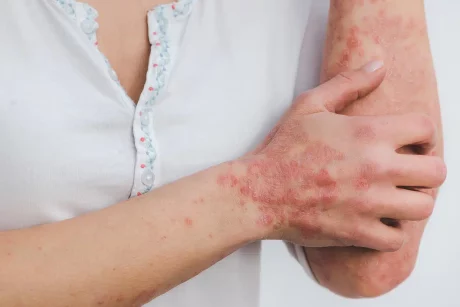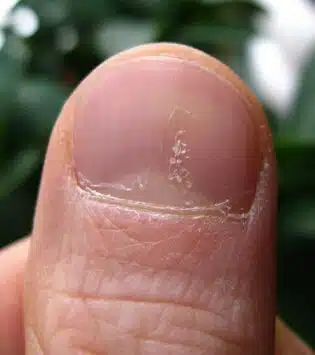
© 2023 House of Health. All rights reserved.
Web Design by Netbloom
Web Design by Netbloom

Red, inflamed patches of skin topped with silvery scales are characteristic of psoriasis. The chronically inflamed lesions commonly appear on the elbows, knees and scalp and less commonly on fingernails, ears and belly (around the tummy button). However, they can occur on any part of the body. Symptoms can include mild itching, but can be severe in some people [11]. Irritation, burning and stinging are also common. [3]
Psoriasis can occur at any age but it tends to appear more between the ages of 15-25 and 50-60 years. Approximately 3% of people are affected [1] and it is generally considered to be an incurable, lifelong condition [11].
People with psoriasis are also more likely to suffer several other conditions including inflammatory bowel disease (IBD), Coeliac disease, obesity, metabolic syndrome, heart disease, gout, liver disease, Type 2 diabetes, eye inflammation (uveitis), and depression. [1,11]
Psoriasis is considered a systemic autoimmune inflammatory condition [4,11], yet no associated antibody has ever been identified. The presence of chemical messengers called cytokines leads to inflammation, causing overgrowth of the skin cells. Normally, skin cells travel rapidly from the lower layers of the skin to the surface, die and are shed within about 6 weeks. When these cells cannot be shed quickly enough, they build up, forming the recognisable silvery scaly plaques of the condition. Psoriasis commonly appears in related people – about one third of sufferers have a family member with it. [11]
There are four different types, including:
Psoriatic arthritis is joint inflammation, which affects about 15% of those with the skin form [1].
Psoriasis sometimes also affects the nails (of fingers and /or toes), causing them to have a pitted appearance, such as shown in the image here.
Nail involvement may affect 40-45% of those with any skin form of the disease, and is more common (up to 90%) in those with the arthritic form. Other nail changes include it bleeding under the nail, whitening, thickening under the nail, crumbling and loosening or separation of it.

Image by Seenms -CC BY-SA 3.0, https://commons.wikimedia.org
The gut is home to a microbial population of about the same number of cells as the human body. The gut microbiome has many functions, including protection against pathogens, breaking down food components, influencing the immune system, maintaining the health of the intestinal barrier, and producing short chain fatty acids that provide fuel for the cells lining the intestines [5,12]. The gut microbiome is also involved in the development of immune cells that have been implicated in psoriasis.[2]
Several studies have investigated the gut microbiome in people with psoriasis and found that it is significantly altered, although results varied in the kinds of alterations found [2,4,12,14]. Case reports of improvement of psoriasis following faecal microbial transplant (FMT) increase the strength of the role of gut bacteria [15].
High diversity of the gut microbiota is generally accepted as desirable. Psoriasis appears to be associated with decreased diversity, and – interestingly -lower diversity is seen in those with moderate to severe compared to those with mild symptoms [6].
Dysbiosis or imbalance of the gut microbiome may lead to “leaky gut” (intestinal hyperpermeability). This increases the risk of the movement of bacteria (and their by-products) into the systemic circulation. This may be involved in triggering psoriasis by promoting chronic systemic inflammation [4,12] and exacerbating the condition. The presence of these components in the blood may activate the immune response and skin cells, starting the inflammatory cascade [10].
Additionally, microscopic lesions and inflammatory changes have been seen on the protective mucous membrane lining the bowel in people with active psoriasis and psoriatic arthritis – even without any noticeable bowel symptoms. [13]
Interestingly, microbial dysbiosis (a shift away from healthy balance) is also implicated in many of the other conditions associated with psoriasis, including digestive diseases, diabetes, obesity, metabolic syndrome, Coeliac disease, and mental illness. [6] You can do a stool microbiome test – order here.
Psoriasis sufferers are more likely to have concurrent liver disease than the general population. Up to 50% of psoriasis sufferers have non-alcoholic fatty liver disease (NAFLD) and the more severe the psoriasis, the more likely the individual is to have NAFLD. Fat storage in the liver leads to an increased risk of cirrhosis, where scar tissue forms. Cirrhosis of the liver has been reported in 13% of psoriasis patients. As well as NAFLD, psoriasis may also be associated with inflammation and damage to the bile ducts.[7]

Knowing your microbial profile may be helpful to identify pathogens (or potential pathogens) and patterns of dysbiosis. Armed with this information, your practitioner can support you with diet and nutritional (and perhaps herbal) interventions to help correct imbalances at the level of the gut.
To determine the role of intestinal hyperpermeability, we recommend conducting the lactulose-mannitol test.
To get started on restoring your skin and saying goodbye to psoriasis, book an appointment with Janine. She will take a comprehensive health history and support you on a healing journey.
References





Book a Consultation with an Expert Here Contact Us Contact Us Agreement* I agree to the Privacy Policy.Subscription By sending this email,
House of Health Ltd
Due staff shortages, please use the website, phone or email to place your order. We will let you know when your items are ready for collection. Dismiss
Stay informed: Get expert tips, free advice, updates, recipes, and special offers delivered straight to your inbox.